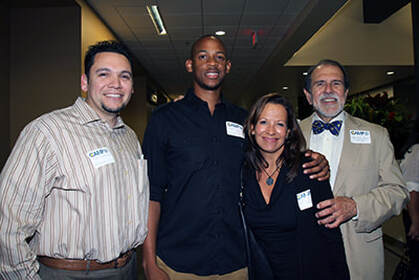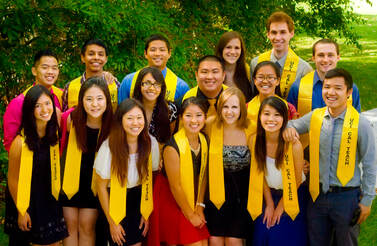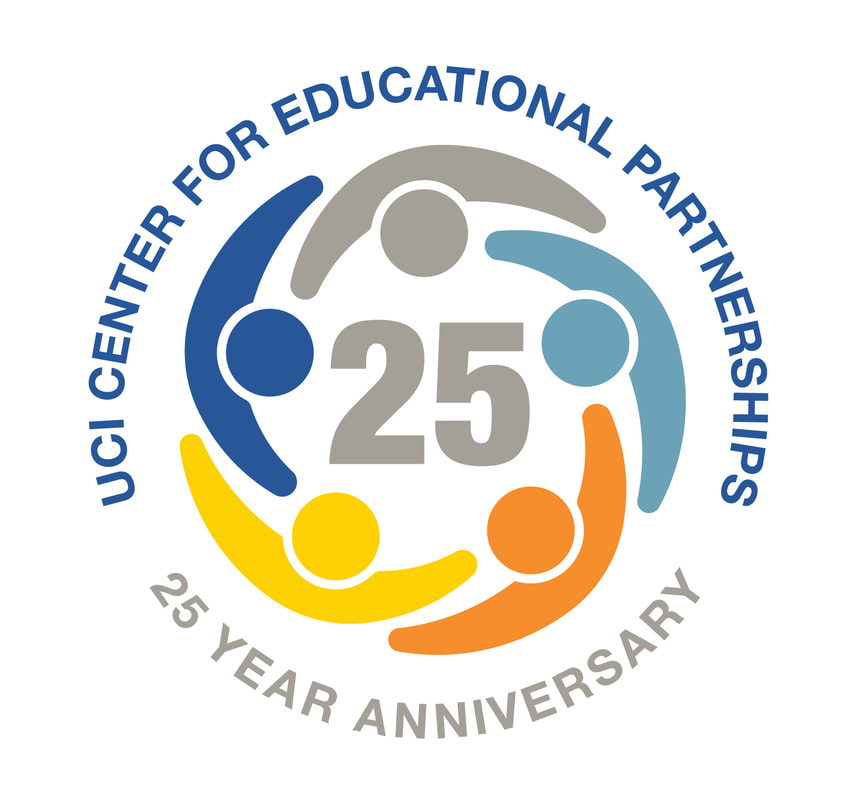CHALLENGE SPARKS INNOVATIONS
|
The year was 1996. California voters had just passed Proposition 209, which prohibited state governmental institutions from considering race, sex, or ethnicity in several areas, including college admissions. The modest increases in racial and economic diversity were reversing quickly, and the University of California Regents and Chancellors convened task forces and think tanks to reimagine a way to ensure that the UC system did not become an exclusive opportunity unavailable to students who did not come from privileged backgrounds.
In response to the looming crisis, key stakeholders at UCI – including CFEP Founding Director Juan Francisco Lara, and Manuel Gómez, former vice chancellor, student affairs – decided to organize and expand existing outreach programs and house them under one roof – CFEP. Today, university-based programs and partnerships that support K-12 and undergraduate students are commonplace. When founded in 1996, however, CFEP represented a new way of engaging students, schools and families. CFEP’s organizational structure and programming soon became emulated by other universities, particularly those in the UC system. |
The programs CFEP established bucked two trends in higher education partnerships that were predominant in 1996. First, many universities believed student inequity was a result simply of a lack of information on various topics, such as financial aid, application and graduation requirements, and more. Second, universities were connecting with local K-12 schools by bringing together multiple district superintendents into one group, and then trying to affect change through the various needs and goals of the superintendents.
CFEP instead forged deep partnerships with local underserved schools and districts. By doing so, it eschewed both the simple “information dump” and the multiple superintendent approach, and was able to develop close, meaningful relationships that live on and continue to create lasting change today.
While CFEP has been imitated in some form at all UC campuses, UCI remains the only such CFEP that focuses on all four distinct but interconnected groups: K-12 students, K-12 teachers, community college students looking to transfer, and UCI undergraduates.
In addition to its overall structure, individual CFEP programs were also replicated across the UCs.
In 1991, the University of California received funding from the National Science Foundation to establish the California Alliance for Minority Participation (CAMP), which provides programming, resources and mentorship to underrepresented students pursuing STEM degrees. UCI served as the first campus to implement the program, with then-Chancellor Jack Peltason serving as the grant’s first principal investigator. The program has since been established at every UC campus.
In 2005, the University of California established CalTeach. The system-wide program is designed to prepare STEM majors for future teaching careers while they complete their undergraduate degrees. UCI CalTeach might have begun in 2005, but it had several precursors on the UCI campus and in CFEP.
CFEP instead forged deep partnerships with local underserved schools and districts. By doing so, it eschewed both the simple “information dump” and the multiple superintendent approach, and was able to develop close, meaningful relationships that live on and continue to create lasting change today.
While CFEP has been imitated in some form at all UC campuses, UCI remains the only such CFEP that focuses on all four distinct but interconnected groups: K-12 students, K-12 teachers, community college students looking to transfer, and UCI undergraduates.
In addition to its overall structure, individual CFEP programs were also replicated across the UCs.
In 1991, the University of California received funding from the National Science Foundation to establish the California Alliance for Minority Participation (CAMP), which provides programming, resources and mentorship to underrepresented students pursuing STEM degrees. UCI served as the first campus to implement the program, with then-Chancellor Jack Peltason serving as the grant’s first principal investigator. The program has since been established at every UC campus.
In 2005, the University of California established CalTeach. The system-wide program is designed to prepare STEM majors for future teaching careers while they complete their undergraduate degrees. UCI CalTeach might have begun in 2005, but it had several precursors on the UCI campus and in CFEP.
|
In 1997, CFEP implemented the UCOP-funded California Math Science Teaching (CMST) Initiative, which promoted STEM education and sought to increase the pipeline of future science and mathematics teachers in California. In 2002, CFEP received a $14.2 million National Science Foundation grant, FOCUS: Faculty Outreach Collaborations Uniting Scientists, Students, and Schools.
These programs provided collaborative opportunities for faculty, secondary math and science teachers, and undergraduates; hosted large-scale regional events and conferences; and funded a summer residential program for community college STEM majors interested in secondary math and science teaching. Combined, they served as a guide for both the creation of CalTeach, and the subsequent emulation of the program at other UC campuses. |
“UCI hosted the first and only community college summer residential program in the UC system, and we were the first UC to have a teaching-themed housing unit,” said Roslyn Soto, former associate director for CalTeach and currently Education Project Manager for the NASA Jet Propulsion Laboratory. “It’s not surprising that UCI was then also the first UC to launch CalTeach, and that the program served as a model for CalTeach implementation at other UC campuses.”
Not only has CFEP been an innovator, its programs have also proven to have tremendous staying power.
Not only has CFEP been an innovator, its programs have also proven to have tremendous staying power.
|
Take, for example, the UCI SAGE Scholars Program. In 1999, UC established the Student Achievement Guided by Experience (SAGE) Scholars Program system-wide. SAGE provides undergraduates who have significant financial need with the tools to invest in their future through leadership training, career exploration, graduate school planning and access to internship and scholarship opportunities.
As of fall 2021, UCI is the only UC that still hosts the SAGE Scholars Program. More impressively, 100 percent of UCI SAGE Scholars all-time have graduated from UCI. In 1993, as part of the Santa Ana Partnership, CFEP began hosting the Summer Scholars Transfer Institute (SSTI). In the program, community college students live on the UCI campus for 10 days and attend classes, culminating in the students earning three transferable credit hours. The SSTI is still a mainstay of CFEP, and has invited students from Santa Ana College, Rio Hondo College, Fullerton College, and East Los Angeles College. Similar residential community college programs have sprung up in recent years across Southern California. |
There are also several current UCI programs that – thanks to an innovative, responsive culture – originated in CFEP. With student input and dedication, CFEP grew three completely new programs from square one and turned each into its own center, before each ultimately transferred to UCI Student Life & Leadership: the Student Outreach and Retention Center, the Fresh Basic Needs Hub, and the DREAM Center.
Now considered a national model of a basic needs resource for undergraduates, the Fresh Basic Needs Hub began in CFEP in response to student feedback, and initially was a mere shelf of canned goods. The Hub quickly grew to a food pantry, farmer’s market and then into the full-service Fresh Basic Needs Hub. Today, the Hub provides UCI undergraduates with basic needs such as food (including farm fresh food), toiletries and transportation while also promoting a shift in cultural consciousness toward understanding the fulfillment of basic needs.
Now considered a national model of a basic needs resource for undergraduates, the Fresh Basic Needs Hub began in CFEP in response to student feedback, and initially was a mere shelf of canned goods. The Hub quickly grew to a food pantry, farmer’s market and then into the full-service Fresh Basic Needs Hub. Today, the Hub provides UCI undergraduates with basic needs such as food (including farm fresh food), toiletries and transportation while also promoting a shift in cultural consciousness toward understanding the fulfillment of basic needs.
/
The past 18 months has transformed all of our realities and it’s time for bold and innovative thinking once again. The pandemic has demonstrated the ways that educational attainment is inseparable from the broader social context. We have realized that student success has to be conceived holistically.
Assistant Vice Chancellor, Educational Partnerships |
The UCI DREAM Center provides academic and social support to UCI’s undocumented population. Former CFEP program participants and student employees called for a meeting with Stephanie Reyes-Tuccio, then-CFEP director and currently assistant vice chancellor, educational partnerships, to express their concerns about a lack of resources for undocumented students on the campus.
“We began by offering workshops and then advocated for a dedicated staff person,” Reyes-Tuccio said. “From there, it snowballed over a few years into a range of programming, legal services and, eventually, its own Center. “We had the freedom, the energy and the willingness to take on big projects, and we were able to generate resources to support various student needs,” Reyes-Tuccio said. “For many programs, we played the role of an incubator, and sometimes, organizationally, a program fits somewhere else and is more aligned with other areas in the university.” |
Moving forward, CFEP is positioned to continue its role as a bellwether.
In this time of great need for schools and underserved communities, CFEP is working aggressively to connect researchers in the School of Education with CFEP partner schools to address the critical needs of our time. New projects and initiatives are underway to combat learning loss due to the COVID-19 pandemic; develop community gardens to simultaneously combat food deserts and teach science; support schools in efforts to achieve racial equity and justice; purposefully nurture students’ mental health as part of their college retention; build pathways from K-12 through college to meaningful careers; create community schools that integrate resources for families from UCI Health and the UCI School of Law; create new opportunities for students to explore degrees and careers through UCI Health, and more.
“The past 18 months has transformed all of our realities and it’s time for bold and innovative thinking once again,” Reyes-Tuccio said. “The pandemic has demonstrated the ways that educational attainment is inseparable from the broader social context. We have realized that student success has to be conceived holistically, both in terms of the whole student and the ecosystem they are a part of.
“It’s an exciting time to do this work.”
In this time of great need for schools and underserved communities, CFEP is working aggressively to connect researchers in the School of Education with CFEP partner schools to address the critical needs of our time. New projects and initiatives are underway to combat learning loss due to the COVID-19 pandemic; develop community gardens to simultaneously combat food deserts and teach science; support schools in efforts to achieve racial equity and justice; purposefully nurture students’ mental health as part of their college retention; build pathways from K-12 through college to meaningful careers; create community schools that integrate resources for families from UCI Health and the UCI School of Law; create new opportunities for students to explore degrees and careers through UCI Health, and more.
“The past 18 months has transformed all of our realities and it’s time for bold and innovative thinking once again,” Reyes-Tuccio said. “The pandemic has demonstrated the ways that educational attainment is inseparable from the broader social context. We have realized that student success has to be conceived holistically, both in terms of the whole student and the ecosystem they are a part of.
“It’s an exciting time to do this work.”
The preceding story is part of the "CFEP: 25 Years of Impact" series, honoring the people, programs and partnerships that have helped impact millions of students, teachers and families over the past quarter century. View the entire series here.






